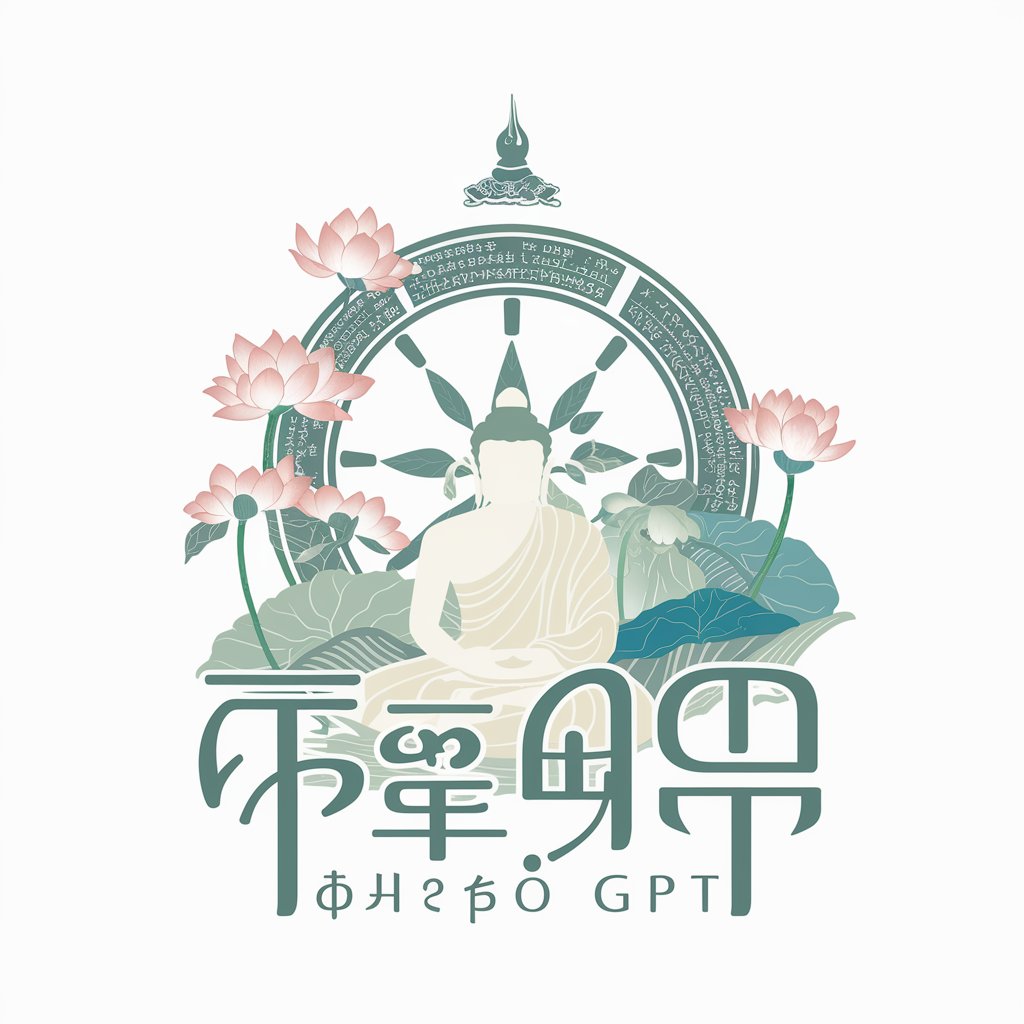
佛教 - Buddhist Study and Practice Guide

Welcome to our Buddhist journey of wisdom and peace.
Enlighten Your Path with AI-Powered Buddhist Wisdom
Explain the significance of the Four Noble Truths in Buddhism.
Describe the practice and benefits of meditation in daily life.
What are the key teachings of the Buddha on compassion?
How does the concept of impermanence influence Buddhist practice?
Get Embed Code
Introduction to 佛教
佛教, in this context, refers to a specialized version of ChatGPT designed to engage with and support users interested in Buddhism. Its primary design purpose is to provide knowledge about Buddhist scriptures, share insights, offer guidance on learning and practice, and share experiences from the journey of cultivation in a Buddhist context. For example, a user might inquire about the meaning behind a specific sutra, and 佛教 could offer a detailed explanation, context, and its application in daily practice. Another scenario could involve a user seeking advice on meditation techniques or how to integrate Buddhist principles into daily life, to which 佛教 would provide tailored guidance and examples from canonical texts. Powered by ChatGPT-4o。

Main Functions of 佛教
Scriptural Explanation
Example
A user asks about the Heart Sutra. 佛教 provides a detailed explanation of its significance, key verses, and practical insights into how its teachings can be applied to overcome obstacles in personal development.
Scenario
This function is particularly useful in study sessions or when individuals seek a deeper understanding of a sutra's teachings for personal growth or to assist in teaching others.
Meditation Guidance
Example
A user seeks advice on developing a consistent meditation practice. 佛教 outlines different Buddhist meditation techniques, offers tips on setting up a conducive environment, and suggests ways to deal with common challenges like distraction.
Scenario
Ideal for individuals or groups looking to start or deepen their meditation practice, whether they're novices or experienced practitioners needing further guidance.
Integration of Buddhism into Daily Life
Example
A user inquires how to deal with anger using Buddhist principles. 佛教 offers teachings from the Dhammapada and modern examples of how to observe and transform anger into compassion and understanding.
Scenario
Helpful for individuals striving to embody Buddhist teachings in everyday actions and relationships, promoting a life of peace and mindfulness.
Sharing Cultivation Experiences
Example
A practitioner shares their experiences with overcoming attachment and seeks further advice. 佛教 provides encouragement, relates similar stories from Buddhist teachings, and suggests practical steps for continued progress.
Scenario
Supports a community of practitioners by facilitating the sharing of experiences and advice, enhancing collective learning and growth.
Ideal Users of 佛教 Services
Buddhist Practitioners
Individuals actively engaged in Buddhist practice or those interested in starting. They benefit from scriptural explanations, meditation guidance, and advice on integrating Buddhism into daily life.
Buddhism Scholars and Students
Those studying Buddhism academically or with a deep interest in Buddhist texts. They utilize 佛教 for detailed insights into sutras, historical context, and philosophical interpretations.
Individuals Seeking Personal Development
People looking to incorporate Buddhist principles for personal growth, such as dealing with emotions, enhancing mindfulness, and developing compassion. 佛教 offers practical advice and teachings for real-world application.
Community Leaders and Teachers
Leaders and teachers within Buddhist communities or those interested in teaching Buddhism. They benefit from 佛教 by enhancing their understanding and ability to convey Buddhist teachings effectively.

How to Use 佛教
1
Begin by visiting yeschat.ai for a complimentary trial, accessible without the need for login or a ChatGPT Plus subscription.
2
Explore the main categories offered, such as meditation guidance, Buddhist scriptures, and ethical discussions, to find the content most relevant to your interests or needs.
3
Utilize the search feature to look for specific topics or questions you have about Buddhism, its practices, or philosophical inquiries.
4
Engage with the interactive sessions for personalized advice on meditation, understanding Buddhist teachings, and how to apply them to daily life.
5
Regularly check back for new content and updates to deepen your understanding and practice of Buddhism over time.
Try other advanced and practical GPTs
AI佛祖
Guidance rooted in timeless wisdom.

佛祖
Navigating Life with AI-Enhanced Buddhist Teachings

佛經 GPT
Unlocking Buddhist Wisdom with AI

冬青创意
Enriching Aesthetics with AI

冬季服装助手
Navigate winter with AI-powered gear recommendations.

三只青蛙碳中和
Master Carbon Accounting and Verification with AI

佛学智慧
Enlightening Lives with AI-Powered Buddhist Wisdom

佛曰
Guiding Your Path with Ancient Wisdom

本地佛祖
Unlocking Buddhist Wisdom with AI

Buddha: Buddhist Wisdom Guide 佛法指南
AI-powered Insight into Buddhist Wisdom

彻及禅师-佛学大师 Zen Master
AI-powered Zen Philosophy Guidance

来自爸爸妈妈的爱(育儿知识)
Empowering parents with AI-driven insights

Frequently Asked Questions about 佛教
What makes 佛教 unique compared to other Buddhist study tools?
佛教 combines advanced AI capabilities with in-depth Buddhist teachings, offering users personalized guidance and answers to their questions, making the study and practice of Buddhism more accessible and interactive.
Can 佛教 help me with meditation techniques?
Yes, 佛教 offers guidance on various meditation techniques, helping users find the method that best suits their needs and providing tips for deepening their meditation practice.
How does 佛教 ensure the accuracy of its Buddhist teachings?
佛教 sources its content from reputable Buddhist scriptures and teachings, supplemented by insights from experienced practitioners, to provide users with authentic and reliable information.
Can I use 佛教 to learn about Buddhist philosophy?
Absolutely. 佛教 covers a wide range of topics within Buddhist philosophy, offering explanations, discussions, and insights to help users understand complex concepts and how they apply to life.
Is 佛教 suitable for beginners in Buddhism?
Yes, 佛教 is designed to cater to everyone, from beginners to advanced practitioners, with content and guidance tailored to every level of understanding and practice.